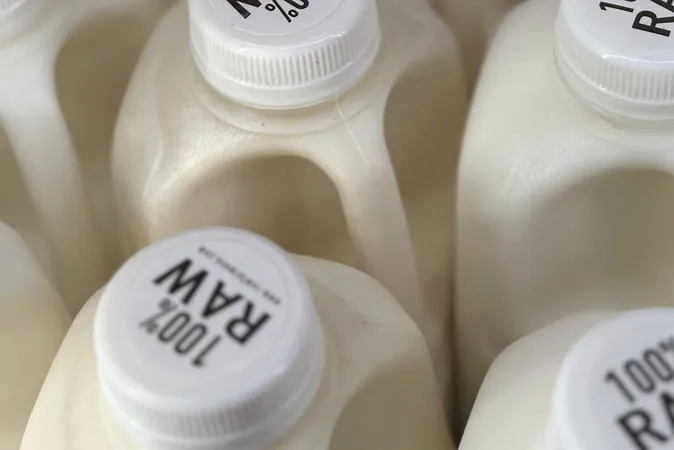
Bird Flu Scare: Raw Milk Contaminated – What You Need to Know!
2024-11-26
Author: Michael
In a shocking revelation, the bird flu virus has been detected in raw, unpasteurized milk sold across California. This alarming find raises crucial concerns, especially as discussions around the wider distribution of raw milk have intensified following remarks from President-elect Donald Trump’s nominee for health secretary, Robert F. Kennedy Jr.
Experts are sounding the alarm on the risks associated with raw milk consumption. Michael Osterholm, an infectious disease researcher at the University of Minnesota, emphasizes, “Raw milk should be treated with caution. It can harbor infectious agents that pose serious health threats.”
The California health department recently announced a voluntary recall of a batch of "cream top" whole raw milk produced by Raw Farm LLC from Fresno, after the Santa Clara County health officials discovered the bird flu virus in a routine test. While there have been no reported illnesses linked to this particular product, the state has urged consumers to avoid drinking this milk and for retailers to remove it from shelves.
Key Facts About Bird Flu and Raw Milk:
Bird flu, specifically the highly pathogenic H5N1 strain, has been spreading rapidly throughout U.S. dairy farms. Over 435 dairy herds in California alone have reported infections, and alarming levels of the virus have been detected in milk from affected cows. Government tests have revealed that as many as 20% of pasteurized milk samples also contained remnants of the virus, underscoring the importance of pasteurization, which effectively kills both the bird flu virus and harmful bacteria such as E. coli.
California's Department of Food and Agriculture has stepped up its surveillance by conducting weekly tests of raw milk in the state’s dairies. Although additional tests at Raw Farm sites returned negative for the virus, health officials plan to increase testing frequency to keep consumers safe. Experts caution that the lack of widespread testing on raw dairy products means many other contaminated products could still be on the market.
Can You Get Sick from Drinking Raw Milk?
Currently, there is no evidence that humans have contracted the bird flu virus from raw milk consumption. Most known cases this year involved dairy or poultry workers who had close contact with infected animals. Interestingly, studies have shown that mice fed raw milk contaminated with bird flu exhibited severe illness, while barn cats consuming milk from infected cows suffered critical neurological damage.
Nicole Martin, a microbiologist with Cornell University's Milk Quality Improvement Program, warns, “While we don’t yet know the risks for human consumers, preliminary evidence suggests exercising caution with raw milk is prudent.”
Why Do People Drink Raw Milk?
Despite the risks, approximately 4.4% of U.S. adults, equating to about 11 million people, reportedly indulge in raw milk annually. Proponents highlight its perceived health benefits and superior taste as reasons for their consumption. Mark McAfee, owner of Raw Farm, claims their milk is “unprocessed and complete,” packed with essential vitamins and beneficial bacteria.
Kennedy, an outspoken supporter of raw milk, has pledged to ease restrictions surrounding its sale, arguing against the FDA's current stance on unpasteurized milk. He, along with McAfee, is an avid consumer and advocate for what they call "gorgeous, safe, delicious raw milk."
Expert Warnings on Raw Milk Safety
Health officials have long warned that raw milk can lead to outbreaks of illnesses that range from mild to severe. Between 1998 and 2018, the CDC linked over 200 outbreaks to raw milk, affecting more than 2,600 people and resulting in over 225 hospitalizations. The Pasteurized Milk Ordinance established in 1924 drastically reduced dairy-related illnesses from 25% to about 1% in the present day.
As consumers continue to turn to raw milk for perceived benefits, the findings of the bird flu virus serve as a stark reminder of the potential dangers related to unpasteurized dairy products. Stay informed, stay safe!









 Brasil (PT)
Brasil (PT)
 Canada (EN)
Canada (EN)
 Chile (ES)
Chile (ES)
 España (ES)
España (ES)
 France (FR)
France (FR)
 Hong Kong (EN)
Hong Kong (EN)
 Italia (IT)
Italia (IT)
 日本 (JA)
日本 (JA)
 Magyarország (HU)
Magyarország (HU)
 Norge (NO)
Norge (NO)
 Polska (PL)
Polska (PL)
 Schweiz (DE)
Schweiz (DE)
 Singapore (EN)
Singapore (EN)
 Sverige (SV)
Sverige (SV)
 Suomi (FI)
Suomi (FI)
 Türkiye (TR)
Türkiye (TR)